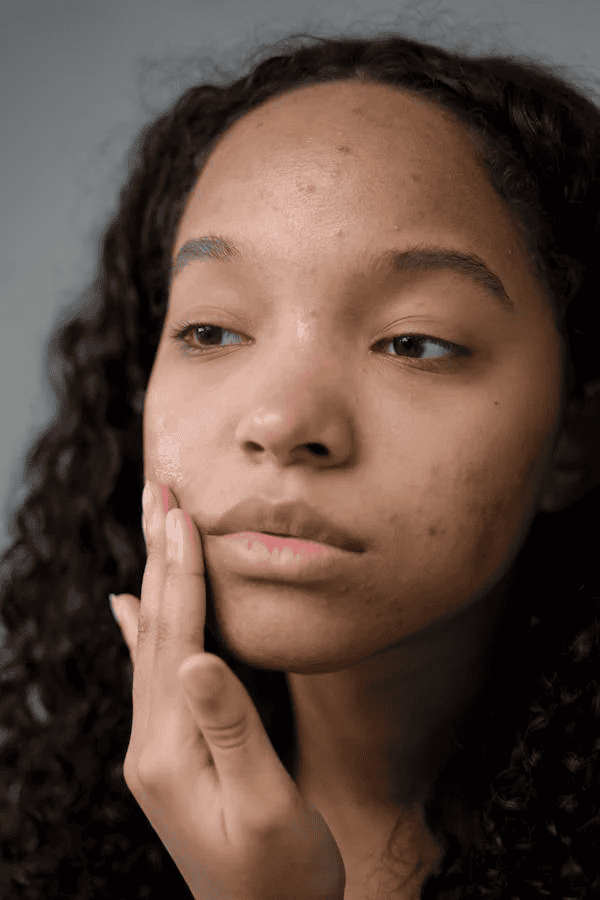Pimple scars are a common concern for many individuals with Black skin. While anyone can develop pimple scars, people with Black skin may face unique challenges when it comes to treating and preventing these scars. In this article, we will explore the science behind pimple scars, the specific challenges for Black skin, prevention strategies, and the various treatment options available. We will also discuss the psychological impact of pimple scars and provide tips for coping with acne scars. By understanding these key aspects, individuals with Black skin can be better equipped to address pimple scars and maintain healthy, radiant skin.

Understanding Pimple Scars
Pimple scars are the result of the skin’s natural healing process after an acne lesion has healed. When a pimple forms, the body produces collagen to repair the damaged skin. However, the production of collagen can be uneven, leading to different types of scars, such as atrophic scars (indented scars) or hypertrophic scars (raised scars).
The Science Behind Pimple Scars
Pimple scars occur when the body’s inflammatory response to acne disrupts the normal healing process. Inflammation can damage the collagen, leading to the formation of scars. Additionally, certain factors like picking or squeezing pimples can increase the likelihood of scarring.
Why Pimple Scars Occur
Pimple scars can occur in individuals of any skin tone or type. However, people with Black skin may be more prone to developing certain types of scars due to the unique characteristics of their skin.
It is essential to understand that not all pimple scars are the same. Atrophic scars, also known as icepick scars, boxcar scars, or rolling scars, are common types of pimple scars. Icepick scars are narrow, V-shaped scars that go deep into the skin. Boxcar scars are wider with defined edges, while rolling scars create a wave-like appearance on the skin’s surface.
Furthermore, hypertrophic scars, which are raised and firm, can also result from severe acne. These scars occur when the body produces too much collagen during the healing process, leading to a raised appearance on the skin. Understanding the different types of pimple scars can help individuals explore suitable treatment options to address their specific scar type effectively.
Pimple Scars and Black Skin
Black skin has distinct qualities that require careful consideration when it comes to managing pimple scars.
The Unique Challenges for Black Skin
Black skin has more melanin, which can make it more prone to hyperpigmentation, a condition where dark spots develop after inflammation or injury to the skin. This means that the healing process after a pimple can often result in dark spots that take longer to fade. Additionally, Black skin tends to have a higher oil production, which can contribute to more frequent and severe breakouts.
How Black Skin Reacts to Acne Scarring
Acne scars on Black skin can appear more prominent due to the contrast between the dark skin tone and the scar tissue. This can have a significant impact on an individual’s self-esteem and overall well-being.
It is essential for individuals with Black skin to be aware of these unique challenges and take proactive steps to address them. One crucial aspect of managing pimple scars on Black skin is to avoid picking or squeezing pimples, as this can lead to further inflammation and worsen hyperpigmentation. Instead, gentle skincare routines that include products specifically formulated for dark skin can help in reducing the appearance of pimple scars.
Furthermore, seeking professional help from a dermatologist experienced in treating Black skin can provide tailored solutions for managing pimple scars effectively. Treatments such as chemical peels, microneedling, or laser therapy may be recommended based on the individual’s skin type and the severity of the scarring. By taking a proactive approach and seeking expert guidance, individuals with Black skin can effectively address pimple scars and achieve a clearer, more even complexion.
Prevention of Pimple Scars
Preventing pimple scars on Black skin requires a comprehensive approach that combines effective skincare and healthy habits.
Black skin is more prone to developing hyperpigmentation and keloid scarring, making it essential to take proactive measures to prevent pimple scars. In addition to skincare, lifestyle factors such as diet, hydration, and sun protection play a crucial role in maintaining skin health and minimizing the risk of scarring.
Skincare Routine for Black Skin
A well-designed skincare routine is crucial for preventing pimple scars on Black skin. It should include gentle cleansing, regular exfoliation, and the use of products specifically formulated for Black skin. Ingredients like vitamin C and niacinamide can help even out skin tone and improve the appearance of scars.
Furthermore, incorporating treatments such as chemical peels or microneedling, under the guidance of a dermatologist, can aid in reducing the visibility of existing scars and preventing new ones from forming. These procedures work by promoting collagen production and accelerating skin cell turnover, resulting in smoother, more even-toned skin.
Dietary Habits and Pimple Scars
While diet alone cannot guarantee the prevention of pimple scars, maintaining a balanced diet rich in fruits, vegetables, and antioxidants can support overall skin health. Drinking plenty of water also helps keep the skin hydrated and aids in the healing process.
Incorporating foods rich in omega-3 fatty acids, such as salmon and chia seeds, can help reduce inflammation in the skin and promote faster healing of acne lesions, thereby reducing the likelihood of scarring. Additionally, avoiding excessive consumption of processed foods and sugars can help prevent breakouts that may lead to scarring, maintaining a clear and healthy complexion.

Treatment Options for Pimple Scars on Black Skin
When pimple scars do occur on Black skin, various treatment options are available, depending on the severity and type of scars.
It is important to note that Black skin is more prone to developing post-inflammatory hyperpigmentation (PIH) after a pimple heals. This means that the skin can darken in the area where the pimple once was, leading to persistent discoloration. Understanding this unique characteristic of Black skin is crucial in determining the most effective treatment approach.
Over-the-Counter Solutions
Over-the-counter products containing ingredients like retinol, alpha hydroxy acids (AHAs), and hydroquinone can help improve the appearance of pimple scars on Black skin. These products work by promoting skin cell turnover, reducing hyperpigmentation, and promoting collagen production.
Additionally, incorporating products with niacinamide, vitamin C, or licorice extract can further aid in brightening the skin and reducing the appearance of scars. Consistent and gentle skincare routines are essential in managing pimple scars and maintaining skin health.
Medical Treatments for Pimple Scars
For more severe pimple scars on Black skin, medical treatments such as laser therapy, chemical peels, microneedling, or dermal fillers may be recommended. These treatments can effectively minimize the appearance of scars and improve overall skin texture.
Laser therapy, for example, can target specific areas of hyperpigmentation without affecting the surrounding skin, making it a precise and effective option for pimple scars on Black skin.
Chemical peels help in exfoliating the top layers of the skin, revealing newer and smoother skin underneath. Microneedling stimulates collagen production, leading to improved skin texture and reduced scarring over time. Dermal fillers can plump up depressed scars, providing a smoother skin surface.
The Psychological Impact of Pimple Scars
The presence of pimple scars on Black skin can have a profound psychological impact on individuals, affecting their self-confidence and overall quality of life.
It is essential to recognize that the psychological effects of pimple scars can vary from person to person. Some individuals may experience feelings of shame, embarrassment, or even depression due to their skin imperfections. These emotions can impact various aspects of their lives, including social interactions, work performance, and mental well-being.
Dealing with Self-Esteem Issues
Coping with self-esteem issues caused by pimple scars requires a multi-faceted approach. Seeking support from loved ones, practicing self-care, and consulting with a dermatologist or mental health professional can be beneficial.
Furthermore, engaging in self-affirmations and mindfulness practices can help individuals cultivate a more positive self-image and combat negative thoughts related to their skin condition. Building a strong support network and surrounding oneself with understanding and encouraging individuals can also aid in boosting self-esteem and resilience.
Tips for Coping with Acne Scars
Developing healthy coping mechanisms and adopting positive self-talk can help individuals with pimple scars on Black skin navigate their emotional well-being. Engaging in activities that promote self-confidence, such as exercise or creative outlets, can also contribute to a more positive mindset.
In addition to these strategies, exploring skincare options tailored to treating acne scars, such as topical treatments or professional procedures, can empower individuals to take proactive steps towards improving the appearance of their skin. It is essential to approach skincare with patience and consistency, as visible results may take time to manifest.
Conclusion
In conclusion, pimple scars on Black skin can present unique challenges due to the skin’s specific characteristics and healing process. However, with proper understanding, prevention strategies, and access to effective treatment options, individuals with Black skin can achieve and maintain healthy, scar-free skin. Additionally, addressing the psychological impact of pimple scars is essential for fostering self-esteem and overall well-being. By learning about these various aspects, individuals with Black skin can take proactive steps towards a healthier and more confident future.

